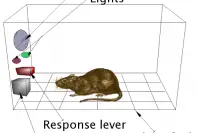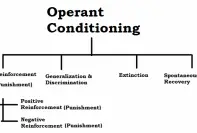The type of conditioning learning process in which behavior is affected or controlled by its consequences is called operant conditioning. Operant conditioning, along with classical conditioning, was the major analysis point in the 20th century, and these two sorts of learning have still dominated the core of behavior analysis at present.
- Neutral Operants
- Reinforcers
- Punishers
If you take into account the various behaviors you have learned over the years, or take into consideration your factors of motivation when you were a kid, you would probably find quite a variety of conditions that can be termed as operant conditioning. Operant conditioning is applied in our daily life without us even knowing it. Here are some examples to support the theory.
Example 1:
Class presentations are one of the mandatory class activities held in most schools. Consider a scenario where a student elaborately explains his presentation.

If the student is applauded and complimented, he/she is more likely to be encouraged for similar presentations in the future. On the other hand, if the student is laughed at or criticized, future presentations are likely to be nothing but a formality.
Here, the reactions of the class and the teacher are the positive and negative reinforcers. Being cheered is the positive reinforce, while being booed is the negative reinforce.
Example 2:
More practical example of operant conditioning in adult life would be going to a job every day. The paycheck at the end of the month is what motivates an average person to go to work every day
Here, the paycheck is the positive reinforcer. Workplaces often offer bonuses for top employees for this very reason. The prospect of getting rewards encourages everyone to work harder and produce better results.
On the other hand, not getting paid for the amount of effort put-in discourages anyone from work. No one likes to work for free.
Example 3:

Consider a scenario where a student is neglecting his studies and has started failing, and still doesn’t care enough to change his ways. If a student is scolded by the teacher and the parents take certain action like reducing his allowance, the student, even though reluctantly, will be forced to study to avoid the same consequences again.
This is a perfect example of punishment induced conditioning learning or commonly, positive punishment. The punishment received by the student encourages him to study harder and hopefully not-fail again.
Example 4:
An employee getting criticized in front of the whole office by his boss and having certain privileges taken away as a consequence to his bad behavior at work will motivate him to stay in line and be more sincere.
Conclusion
The examples mentioned above cover both major concepts of operant conditioning; Reinforcement and Punishment. Examples 1 & 2 are related to reinforcement, whereas examples 3 & 4 refer to punishment induced operant conditioning.
Operant conditioning is a fundamental learning method that has plenty of perks. Some other notable examples of the learning method are how armies are reinforced and punished to discipline them. Businesses also use the method to increase overall productivity.




